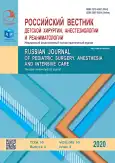Особенность течения спаечного процесса брюшной полости у детей с различной степенью выраженности дисплазии соединительной ткани
- Авторы: Минаев С.В.1, Тимофеев С.И.2, Григорова А.Н.1, Владимирова О.В.1, Пашнева Е.И.1, Колесников Е.Г.3
-
Учреждения:
- Федеральное государственное бюджетное образовательное учреждение высшего образования «Ставропольский государственный медицинский университет» Министерства здравоохранения Российской Федерации
- Государственное бюджетное учреждение здравоохранения «Магаданская областная детская больница»
- Федеральное государственное бюджетное образовательное учреждение высшего образования «Кубанский государственный медицинский университет» Министерства здравоохранения Российской Федерации
- Выпуск: Том 10, № 4 (2020)
- Страницы: 381-389
- Раздел: Оригинальные исследования
- URL: https://journal-vniispk.ru/2219-4061/article/view/122935
- DOI: https://doi.org/10.17816/psaic705
- ID: 122935
Цитировать
Полный текст
Аннотация
Цель. Оценка спаечного процесса брюшной полости у детей с различной степенью выраженности дисплазии соединительной ткани (ДСТ).
Методы. В период c 2005 по 2019 г. наблюдался 91 ребенок со спаечной болезнью брюшной полости в возрасте 10,6 ± 1,4 года. Мальчиков было 53 (58,2 %), девочек — 38 (41,8 %). Пациенты были разделены на 2 группы: группа 1 (69 детей без ДСТ) и группа 2 (22 пациента с ДСТ). Диагностику ДСТ осуществляли на основании клинико-лабораторных данных и скрининговых карт. У всех пациентов проведена оценка клинического течения, макроскопическая визуальная оценка выраженности спаечного процесса в брюшной полости по трем различным шкалам (Nair, F. Coccolini, Н.И. Аюшинова). Иммуногистохимические исследования проводили к коллагену I, III, IV типов, к Laminin γ1, факторам ангиогенеза, TGF-β и FGFR1. Статистический анализ осуществляли методами вариационной статистики с использованием хи-квадрат-теста, U-тестов Манна–Уитни, для достоверности различий между группами, также метод ранговой корреляции Спирмена.
Результаты. Для оценки спаечного процесса наиболее информативной оказалась шкала Н.И. Аюшинова. При этом в группе 2 средний балл составил 7 ± 0,8 балла, в группе 1 — 14 ± 1,2 балла (rs < 0,35; р < 0,05). В группе 2 в интраабдоминальных спайках отсутствовали (56 %) или определялись хаотичные фрагменты (44 %) коллагена I типа. Соотношение коллагена I типа к коллагену III типа составляло 2,7:5,1. В группе 1 соотношение коллагена I типа к коллагену III типа — 5,9:1,8. Соотношение коллагена IV к коллагену I типа — 6,5:2,9. В обоих группах было умеренное (++) количество TGF-β. FGFR1 имел место в группе 1 (++++). Положительная реакция была в фибробластах и макрофагах (U = 79,00; р = 0,006). Статистически значимые значения отмечались для VEGF в сравниваемых группах (rs = 0,632; р < 0,001) с положительной корреляционной связью.
Заключение. Таким образом, проведенное исследование показало особенности клинического течения и морфологических изменений при развитии спаечного процесса брюшной полости у детей с различной степенью выраженности дисплазии соединительной ткани. Полученные данные диктуют необходимость индивидуального подхода в прогнозировании спаечной болезни, а также целенаправленной лечебно-профилактической помощи.
Ключевые слова
Полный текст
Открыть статью на сайте журналаОб авторах
Сергей Викторович Минаев
Федеральное государственное бюджетное образовательное учреждение высшего образования «Ставропольский государственный медицинский университет» Министерства здравоохранения Российской Федерации
Email: sminaev@yandex.ru
д-р мед. наук, профессор, заведующий кафедрой детской хирургии с курсом дополнительного профессионального образования
Россия, СтавропольСергей Иванович Тимофеев
Государственное бюджетное учреждение здравоохранения «Магаданская областная детская больница»
Email: alina.mashchenko@mail.ru
канд. мед. наук, заведующий отделением детской хирургии
Россия, МагаданАлина Николаевна Григорова
Федеральное государственное бюджетное образовательное учреждение высшего образования «Ставропольский государственный медицинский университет» Министерства здравоохранения Российской Федерации
Автор, ответственный за переписку.
Email: alina.mashchenko@mail.ru
канд. мед. наук, доцент кафедры детской хирургии с курсом дополнительного профессионального образования, ассистент кафедры гистологии
Россия, СтавропольОксана Владимировна Владимирова
Федеральное государственное бюджетное образовательное учреждение высшего образования «Ставропольский государственный медицинский университет» Министерства здравоохранения Российской Федерации
Email: alina.mashchenko@mail.ru
канд. мед. наук, доцент кафедры общей хирургии
Россия, СтавропольЕлена Ивановна Пашнева
Федеральное государственное бюджетное образовательное учреждение высшего образования «Ставропольский государственный медицинский университет» Министерства здравоохранения Российской Федерации
Email: alina.mashchenko@mail.ru
канд. мед. наук, доцент кафедры гистологии
Россия, СтавропольЕвгений Геннадьевич Колесников
Федеральное государственное бюджетное образовательное учреждение высшего образования «Кубанский государственный медицинский университет» Министерства здравоохранения Российской Федерации
Email: alina.mashchenko@mail.ru
канд. мед. наук, ассистент кафедры хирургических болезней детского возраста
Россия, КраснодарДополнительные файлы








